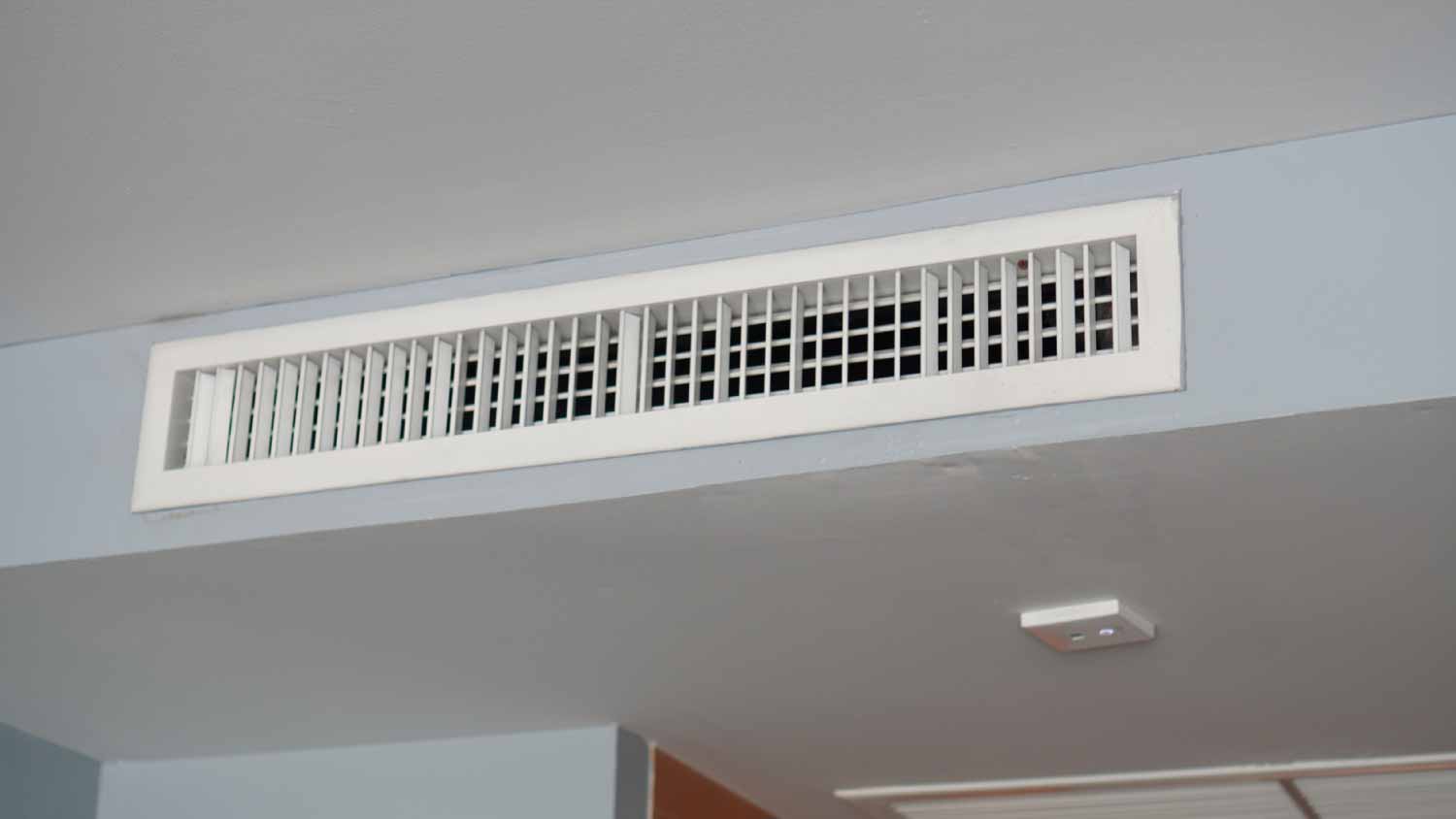
If your air conditioner won’t turn on or makes chattering noises, you might have a bad contactor. Learn more about AC contactor replacement costs in this guide.
Here’s what to know so you don’t sweat this decision


Whole-house dehumidifiers are built directly into existing HVAC systems.
They’re easier to maintain and better for large spaces than portable dehumidifiers.
Consider alternatives if you live in a smaller home.
High and prolonged humidity is the thief of comfort in many abodes, but you may wonder if your problem warrants a long-term solution like a whole-house dehumidifier. These setups can be life-changing—they’ll get rid of mold smells in your house for one—but they aren’t perfect either. Everything from high up-front costs to a lack of portability may make you reconsider.
Here are all the whole-house dehumidifier pros and cons, including what they can and can’t do and when to seek a different solution.
A whole-house or HVAC dehumidifier is a system that removes excess humidity from your home at large.
While there are several types of whole-house humidifiers, there’s really only one kind of whole-house dehumidifier. It’s built directly into your HVAC system and uses refrigerants to absorb and cool warm and wet air. This causes the moisture within the air to return to a liquid state, at which point the system drains it and recycles the cool, dry air back into your home.
That sounds pretty great, but do you actually need it? Here are some of the biggest advantages and disadvantages of a whole-house dehumidifier.
| Pros | Cons |
|---|---|
| More energy efficient | Higher up-front cost |
| Better comfort and air quality | DIY not possible |
| Lengthens HVAC life span | Can’t be moved after installation |
| Little to no maintenance | Not needed in small homes |

The truth is that whole-house dehumidifiers come with more pros than cons—like the fact they cut down on mold and mildew and give your HVAC system a longer life.
A dehumidifier will not lower your bills the moment you start using it—they are another thing to power, after all. But because it will reduce the need for heating and cooling by maintaining a normal and comfortable interior temperature, you’ll end up paying less over time.
When it’s heavy and sticky outside, the last thing you want to come home to are the same exact conditions. A whole-house dehumidifier will make your domain more comfortable and healthier to live in. Not only is extreme humidity downright unbearable but it’s also associated with respiratory and allergy conditions. So eliminating it will make you feel better mentally and physically.
Mold and mildew love warm and moist conditions but will have a hard time forming without humidity. Portable dehumidifiers may limit mold and mildew's growth in small areas but will have a harder time keeping them at bay throughout your home—which means that mildew smell in your carpet may still linger despite your best efforts. By contrast, whole-house dehumidifiers treat your whole house and make it so you can breathe easily in every room.
With stable humidity levels, the temperature in your home won’t fluctuate as much. That means you won’t need to heat or cool as often, and the less frequent usage will ensure your HVAC system lasts that much longer.
Anyone who owns a portable dehumidifier knows how quickly they can fill up with water—and how often they need to be manually drained to remain functional. Whole-house systems drain themselves and don’t require much care beyond the annual checkup (or whenever it stops performing as it should).
Whole-house dehumidifiers are as good as they sound, but there are still a couple of downsides worth considering before investing.
Price is a big barrier to entry for a home addition like this because the cost to install a whole-house dehumidifier ranges from $1,300 to $2,800. On the flip side, a portable dehumidifier costs much less—as little as $50 and up to $350. While it may not be suitable for large estates, it will be sufficient in small spaces like studio apartments or tiny homes or even to reduce moisture in bathrooms.
Installing a whole-house dehumidifier yourself is an expert project that only seasoned DIYers should attempt. Because materials are most of the cost, going it alone won’t save much on costs either. Instead, hiring an HVAC technician near you is the way to go for a proper installation and guaranteed great results.
Unlike single-unit dehumidifiers, whole-house systems are impossible to move once installed. That means you should hold off if you’re planning on relocating in the foreseeable future.
Portable, single-unit dehumidifiers work just as well as whole-house units in small spaces, but they cost way less and don’t require tricky installation.
There’s no harm in testing out alternative dehumidifying solutions before committing to a whole-house dehumidifier.
Natural dehumidification techniques: tricks like using charcoal or silica gel to absorb extra humidity cost next to nothing.
Portable dehumidifiers: These single-space units are ideal for small setups, like studio apartments.
Ventilation: Adding additional ventilation to areas like basements and bathrooms will ensure the moisture they create doesn’t spread to other parts of your home.
If you live in a place where humidity levels are consistently high, no matter what you do, it’s time to consider a whole-house dehumidifier. Larger homes in particular will benefit more, whereas you can get away with a smaller, portable dehumidifier in small abodes.
From average costs to expert advice, get all the answers you need to get your job done.

If your air conditioner won’t turn on or makes chattering noises, you might have a bad contactor. Learn more about AC contactor replacement costs in this guide.

A worn AC fan motor can cause your system to overheat. Budget for AC unit fan motor costs, including parts and labor, with this guide.

Switching from oil to gas heating could impact your savings. This guide will help you understand the cost to convert from an oil furnace to a gas furnace.

Tackling unwanted odors from indoor plants can be tricky. Learn how to use a carbon filter in your duct fan to improve air quality.

Do you have a clogged AC drain line? We dig into the reasons behind those pesky blockages and how to clear them for optimal AC performance.
How to clean your air conditioner depends on the unit type. Sometimes, a good hose-down is all you need if you have centralized AC. This guide can help with the cleaning process.